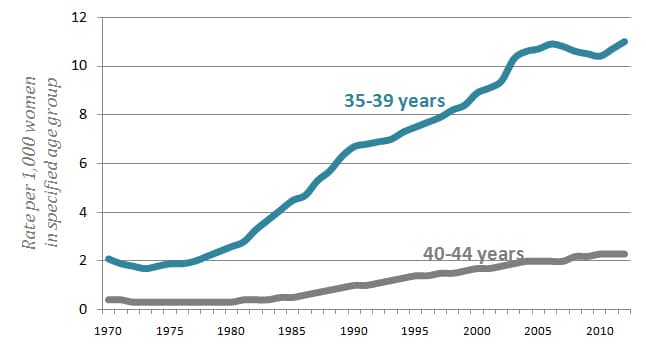In a recent FOX 5 D.C. news segment, Stephen J. Greenhouse, M.D., of Shady Grove Fertility’s Fair Oaks, VA, office dispelled common myths about in vitro fertilization (IVF) and fertility treatment. During the segment, which aired on March 22, 2015, Maureen Umeh investigated these IVF myths and misconceptions.
1. Are babies born through IVF different?
“Children born through IVF are no less real than any other child. They come from an egg and a sperm, they’re healthy, and they bring joy to their families,” said Dr. Greenhouse. This myth—of children born through IVF somehow being different—has been promulgated by people before but recently arose after comments from designers Dolce and Gabbana.
Dr. Greenhouse responded to these comments by saying, “Unfortunately when people have a large stand where they can make their voices heard, they may make ignorant comments that can be very hurtful. They need to sit down with these families who are struggling with infertility and need to understand what they go through.”
2. Is age really a factor when you’re trying to conceive?
Statistical trends have shown that the age of women at the birth of their first child has steadily been on the rise since the mid-1970s. While this population trend is a documented fact, female biology and physiology has not changed and age still plays a significant role in female fertility. Women are born with all of the eggs that they will ever have and this number begins to sharply decline for women over the age of 35.
Figure 1. First birth rates by selected age of mother: United States, 1970–2012

NOTE: Access data table for Figure 1 [PDF – 123 KB].
SOURCE: CDC/NCHS, National Vital Statistics System.
This trend, compounded with the fact that age is the number one factor in determining success with fertility treatment, is why age and delaying pregnancy has become such an important topic. Knowing when to proactively seek professional guidance while trying to conceive is key. Thus, for women under the age of 35, infertility is defined as trying to conceive for 1 year or longer. For women 35 to 40, it is recommended that they see a fertility specialist if they’ve been trying to conceive for 6 months, and for women over 40, it’s recommended that they see a fertility specialist after 3 months of trying to conceive.
Dr. Greenhouse also touched on an important aspect of trying to conceive that many couples don’t realize: “Couples [may] have infertility and don’t recognize it. They’ve been having unprotected intercourse for a few years but they’ve only intentionally been trying to conceive for a few months. But years of unprotected intercourse without conception can mean that infertility is present and couples should speak with a fertility specialist.”
3. Is IVF affordable?
Many people assume that insurance does not cover IVF or fertility treatment in general and that it’s incredibly expensive. While fertility treatment can be expensive, many insurance companies actually do provide coverage for treatment. Additionally, SGF offers many comprehensive financial programs to help families going through treatment. One of the most well-known programs is the Shared Risk 100% Refund Guarantee, in which patients pay a set fee for up to six treatment cycles and get their money back in the event they do not take home a baby (some exclusions may apply).
4. Does undergoing IVF treatment mean that you will have multiples (twins, triplets, etc.)?
In the early days of fertility treatment, it was certainly more common for women to have multiples. In the last 10 years though, technological advancements have drastically reduced the potential for multiples, with the twin rate decreasing to around 15 percent and triplets to less than 1 percent of live births in women under 35. “We continue to make great strides in this area, and through elective single embryo transfer (eSET), the incidence of multiple pregnancy has continued to drop at our practice,” said Dr. Greenhouse.
5. Does being healthy ensure that you will not experience infertility?
Unfortunately, being healthy is not a good indicator of whether or not you may experience infertility. Many of the one in eight couples who experience infertility are, indeed, healthy. That being said, there are many health factors that can affect your fertility. “Smoking can have a very negative effect on fertility, and obesity has also been seen to cause fertility complications. Men and women are both at-risk when it comes to smoking and obesity,” explains Dr. Greenhouse.
The bottom line when it comes to IVF is that men and women should not allow myths to influence their decision making. Learn the facts and speak with educated professionals about how fertility treatment can help you. Dr. Greenhouse said, “There are many options out there for people, with a variety of ways to help finance treatments. Coming in to talk with a fertility specialist is a great first step to see if treatment is right for you.”





